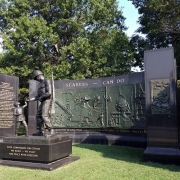What is the Balfour Declaration?
Topic of Study [For H2 History 9174 Students]:
Paper 1: Conflict and Cooperation (1948-2000)
Section B: Essay Writing
Theme III Chapter 1: Arab-Israeli Conflict (1948-1979)
Learn more about the Balfour Declaration to understand its impact on the Arab-Israeli conflict in the 20th Century [Video by The Economist]
Historical Context
During World War One, Britain and France clashed with Germany on the Western Front. In December 1917, British Prime Minister David Lloyd George publicly supported Zionism. The Russian Jew Chaim Weizmann was one of those that led this movement.
The British government’s decision to declare its support of Zionism was partly driven by hopes of garnering Jewish support for the Allied Powers amidst the war.
On 27 November 1914, tentatively reviewing British war aims, [C. P. Scott] raised the question of Palestine and Zionism, but found that the subject was not new to Lloyd George, who told him that he had had a ‘heart to heart’ talk with Herbert Samuel, that he sympathised with the aspirations of a small nation and was interested in a ‘partly Jewish buffer state’. Scott continued diligently to press the Zionists’ case and at the end of January 1917 he urged the British Government to issue a definite statement in favour of making Palestine a national home for the Jews.
An excerpt taken from “The Question of Palestine British-Jewish-Arab Relations, 1914-1918” by Isaiah Friedman.
The Declaration: A letter to Rothschild
On 2 November 1917, British Foreign Secretary Arthur Balfour wrote a letter to Lionel Walter Rothschild, a friend of Weizmann. The letter stated that the British government was in favour of the ‘establishment in Palestine of a national home for the Jewish people’. Rothschild represented the British Jewish community.
His Majesty’s Government view with favour the establishment in Palestine of a national home for the Jewish people, and will use their best endeavors to facilitate the achievement of this object, it being clearly understood that nothing shall be done which may prejudice the civil and religious rights of existing non-Jewish communities in Palestine or the rights and political status enjoyed by Jews in any other country.
An excerpt taken from the Balfour Declaration written by Arthur James Balfour to Lord Rothschild, 2 November 1917.
After the Declaration was made, the League of Nations declared that Palestine would fall under the British Mandate on 24 July 1922. This ‘mandate’ system was meant to give the League authority to administer non-self-governing territories, so as to advance the well-being of the population within.
While the British Mandate allowed both the Jewish and Arab communities to manage their own affairs, the British was unable to maintain regional stability.
But the Balfour Declaration, far from being dropped, became embedded – even augmented – in British policy to Palestine. This continuing British commitment was made in the face of all-but overwhelming evidence and argument that a British-backed Zionist project for a Jewish national home would lead to inter-communal antagonism and, in time, a territory that would be ungovernable. Arab opposition was rekindled after the war and, as Jewish immigration resumed, soon manifested itself in demonstrations, petitions and outbreaks of violence.
An excerpt taken from “Legacy of Empire Britain, Zionism and the Creation of Israel” by Gardner Thompson.
Join our JC History Tuition to learn more about Conflict and Cooperation. The H2 and H1 History Tuition feature online discussion and writing practices to enhance your knowledge application skills. Get useful study notes and clarify your doubts on the subject with the tutor. You can also follow our Telegram Channel to get useful updates.
We have other JC tuition classes, such as JC Math Tuition and JC Chemistry Tuition. For Secondary Tuition, we provide Secondary English Tuition, Secondary Math tuition, Secondary Chemistry Tuition, Social Studies Tuition, Geography, History Tuition and Secondary Economics Tuition. For Primary Tuition, we have Primary English, Math and Science Tuition. Call 9658 5789 to find out more.











